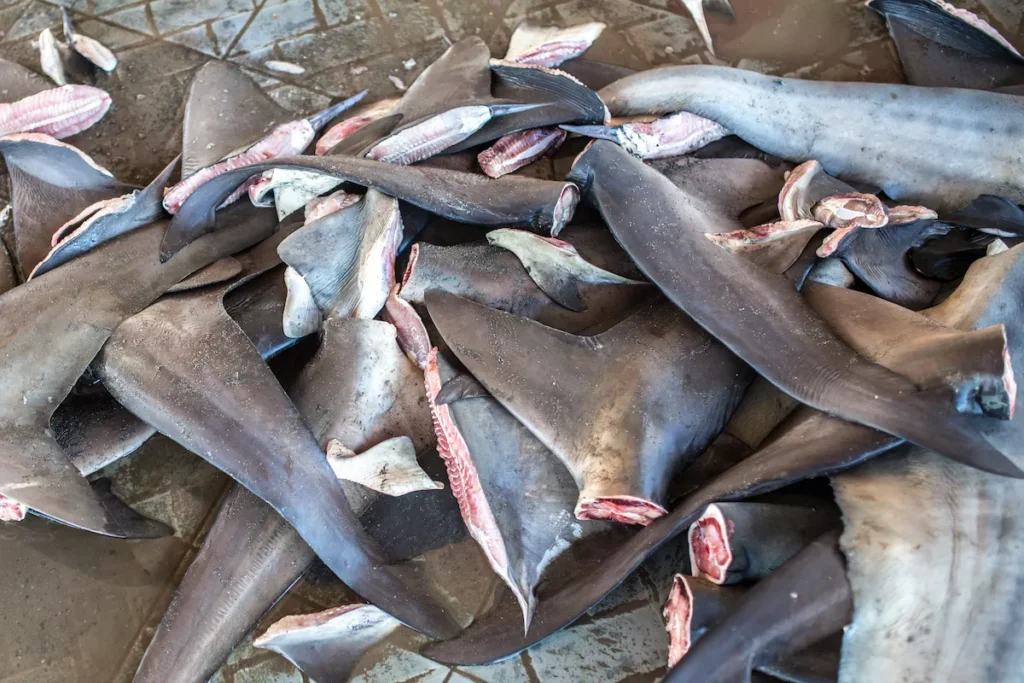
UPDATED: Congress Ends Shark Fin Trade
Lawmakers pass landmark legislation
- Wayne Pacelle
“Congress has taken shark fins off the menu,” said Wayne Pacelle, president of Animal Wellness Action, in celebrating Senate passage Thursday night of the Shark Fin Sales Elimination Act as an amendment to the National Defense Authorization Act. The Senate passed the defense bill 83–11, following a lopsided vote in the House a few days ago. The measure now goes to the President for his signature.
It is the second major wildlife protection measure to pass in December, preceded by the Big Cat Public Safety Act, which halts breeding of big cats for the pet trade or for use as props at roadside zoos. The Shark Fin Sales Elimination Act will halt the domestic trade in fins, used primarily as the centerpiece ingredient in shark-fin soup.
The legislation, introduced by Cory Booker, D-N.J., and Shelly Moore Capito, R-W.V., in the U.S. Senate and Gregorio Sablan, D-CNMI, and Michael McCaul, R-Texas, in the U.S. House of Representatives, was included as an amendment to the 4,400-page National Defense Authorization Act, which passed the House last week.
As with the Big Cats bill, which was first introduced in 2011, it’s been a long struggle on the anti-finning legislation. That measure has amassed overwhelming bipartisan support in the House and Senate over time, with the first formulation introduced more than seven years ago. But it’s never gotten over the finish line. That time has now come.
Also like the Big Cats bill, which was preceded by the Captive Wildlife Safety Act of 2003, the Shark Fins Sales Elimination Act is part of a longer-term incremental process of eliminating a category of animal abuse with serial actions over multiple Congresses. Today’s anti-finning legislation was preceded by two laws in this century on the same topic: 1) the Shark Finning Prohibition Act of 2000 that amended the Magnuson-Stevens Fishery Conservation and Management Act (MSA) to prohibit shark finning in U.S. waters, and 2) the Shark Conservation Act of 2010, which amends the High Seas Driftnet Fishing Moratorium Protection Act and the MSA to require that all sharks be brought to American shores with their fins intact.
The Shark Fin Sales Elimination provides additional safeguards for sharks by banning any trade in shark fins in the United States, no matter where the shark parts originate. It’s more of an anti-trafficking of wildlife bill than a fisheries-management measure.
Shark finning is the grisly practice where fishermen pull in a shark, hack off the fins, and then throw the suffering animal back into the ocean to bleed and die, or drown, or be ripped to pieces by other sharks. Shark finning conjures up cruelty and wanton destruction of the medieval era. But it’s more of a modern evil. Putting an end to it now is the best chance of saving dozens of shark species that are highly vulnerable to mass human killing. Nobody really knows the annual shark toll, but some have estimated the number exceeds an eye-popping 70 million a year on a global scale.
Sharks are apex predators, cleansing and greasing the machinery of ocean ecosystems. Most sharks can live up to 30 years but are slow to reproduce, and they simply have not been able to withstand the ongoing commercial onslaught. Stopping the slaughter for shark-fin soup is one of the most direct routes to protecting biodiversity and keeping apex predators alive and at work.
Famed oceanographer and explorer Sylvia Earle put it this way in a widely circulated quotation:
“Sharks are beautiful animals, and if you’re lucky enough to see lots of them, that means that you’re in a healthy ocean. You should be afraid if you are in the ocean and don’t see sharks.”
In a recent report, the respected nonprofit group Oceana — which has played a crucial role in this legislation — calculated that shark-encounter scuba diving accounted for $221 million in economic activity in the state of Florida last year and was responsible for 3,797 jobs. Scuba divers and dive operations have become important allies in fighting shark finning.
The sad irony is that shark fins are widely reported to be all but tasteless in soup broth. They are said to add “texture,” but primarily they serve as a status delicacy for special occasions in some cultures. In short, humans have been killing sharks by the millions for a nutritionally devoid and tasteless and texturizing appetizer that is the expensive fare of elites.
We know it’s wrong to kill elephants for ivory, rhinos for their horns, and bears for their gall bladders. Commercial operators, in each case, are killing for just a small part of the animal and discarding the rest of the carcass as commercially unusable trash. The same is true for sharks and the slaughter of them for their fins.
Special credit goes to the four lead bill authors, to House Natural Resources Chairman Raul Grijalva and his staff, and to Sens. Maria Cantwell, D-Wash., Roger Wicker, R-Miss., and Brian Schatz, R-Hawaii, for helping to lead this fight.
It took the actions of many key human actors in our current political ecosystem to protect our ocean ecosystems and to spare sharks savage cruelty. And not a moment too soon.